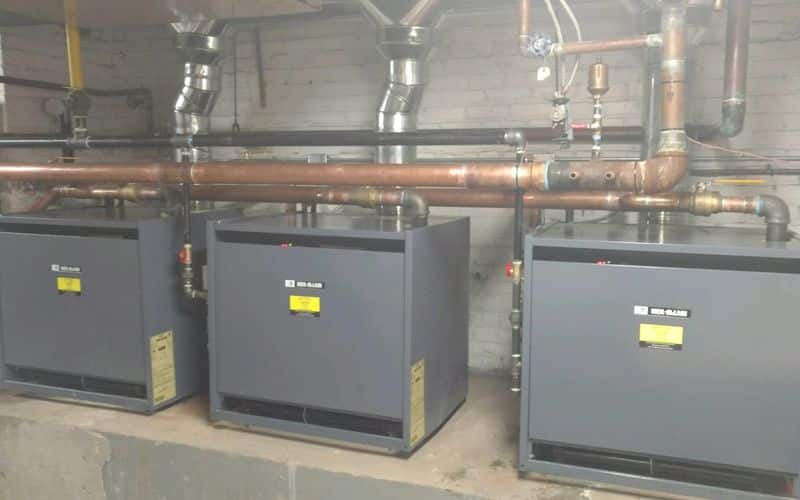Heat Pump Installation and Replacement
Michigan’s top experts for heat pump installation and replacement! 24/7 Emergency availability!
An electricity-powered HVAC material is growing in popularity among heating systems thanks to its versatility and climate-friendliness. Heating pumps are integrating into more homes and businesses in the United States. These heat pump machines are great solutions for homeowners and business owners looking to wean off traditional forms of heat. HVAC technicians are learning innovative ways to install, maintain, repair, and sometimes even replace heat pumps.
Our team at Yates Heating and Cooling offers custom heat pump installation and replacement services to clients, all customized to the client’s budget, building, and lifestyle needs.

Schedule Your Appointment Today
(248) 291-5047Heat Pump Systems
There are many types of heat pumps, including ducted air-source heat pumps, ductless air-source heat pumps, water-source heat pumps, and even ground-source (geothermal) heat pumps.
Generally, all heat pumps work like air conditioners in reverse. They use refrigerant to warm air being pumped in and out of a building or even into the building’s water supply. The heat pump draws in cool air from outside a building or pulls warmth from the ground, heats it, and then redistributes the air. These machines use significantly less energy than a furnace, boiler, or even electric radiator. Yates Heating and Cooling will help home and business owners decide the right machine for their properties.
Installing Central Heat through Heat Pumps
People choose to install central heating into their homes or businesses for many reasons. Many switch to electricity-powered heat because they use electricity-powered cooling. It can be an easier installation process when both systems are operating the same way.
Some use smaller heat pumps in just parts of a building while keeping a furnace or other traditional heating source in other areas. A sweeping majority of people who switch to heat pumps hope to reduce their carbon footprint. Switching from a gas furnace can reduce a building’s carbon emissions by at least half. People also choose a heat pump because they are offered subsidies from their local government. This usually comes in the form of tax incentives or cash rebates. Those interested in these advantages can count on Yates Heating and Cooling for guidance during this process.

Cost of Heat Pumps and Installation
The cost of heat pump installation and replacement jobs depends on a variety of factors. Things like the size of a building, location, heat system location, heat system complexity, and number of crew members needed will all be considered. On average, it typically costs about $4,000 to $7,000 to install a new heat pump. This includes the cost of the pump itself and the labor involved. Some heat pumps can be more expensive, like a solar elcectrical system. It is a little cheaper to replace a heat pump, typically running between $3,000 to $6,000. The cost depends on the system in place and the efficiency of the ductwork running through the home. Homes and business owners often save drastically on their energy costs throughout the year, with some spending up to 50% less. This drastically offsets the cost of the machine, especially during the course of its 10 to 20-year lifespan.
There are many non-monetary costs associated with not replacing a heat pump, though. Think of these inconveniences and issues that commonly come without a heat pump or with a pump needing to be replaced:
- Cost of repairs: A heat pump that is older or faulty will need regular repairs, which can quickly add up. Even those attempting to manage repairs on their own will suffer the cost of materials, tools, time, and effort.
- Higher energy bills: An aging heat pump or building running on traditional heating methods will likely be harder to warm. The electric and gas bills will continue rising the longer the issues are ignored.
- Uneven warmth: A faulty heating system or a nonexistent central heating system will cause a building to vary in temperature. One room may be too hot while the other is too cold. A good-quality, working central heating system will keep people comfortable in a building.
- Annoying critters and noises: Heat pumps can leak, develop holes, and make loud noises when they aren’t working properly. Mold and bacteria can develop and outside inhabitants, like mice or ants, can access the systems. An updated, properly installed heat pump will help stop this.
While the cost of a heat pump installation or replacement can be daunting, the benefits are vast. Yates Heating and Cooling will work with clients and offer products and services best suited to their budgets. We can even offer payment plans and other financing options.
Heat Pump Installation Process
Installing and replacing a heat pump is a relatively routine and quick process for professionals. Yates Heating and Cooling teams manage these jobs regularly, so will work efficiently and cost-effectively. Keep in mind the exact timing and cost will depend on the client and the property. This process of installing or replacing a heat pump is much tougher for a non-professional, though. We often see amateurs take months to complete the installation or replacement process and then find mistakes that prolong the job even more. Don’t shop for the heat pump itself, the accompanying materials needed for it to function, and the tools necessary for its installation. Avoid the work necessary to complete the job as well. Leave it to the professionals; we will do the job quickly and effectively the first time.
Yates Heating and Cooling passionately works with our neighbors throughout southwest Michigan to keep each one warm during the cold winters. We want to find the right equipment at the right price for each of our clients and commit to providing top-tier customer service. We also value our community and environment and hope to help improve it. Contact us today to get a custom quote, then get started saving money on energy, cut down carbon emissions, and have a safer and healthier home or business!


